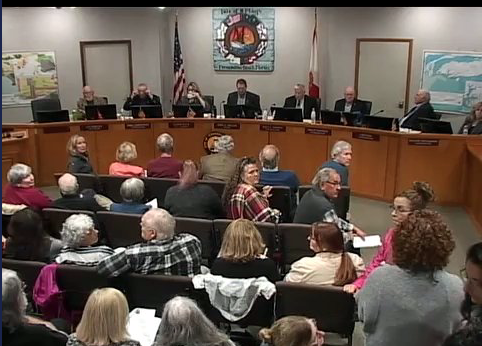Submitted by Suanne Z. Thamm
Reporter – News Analyst
February 28, 2019 12:35 p.m.

People accustomed to watching live Fernandina Beach City Commission meetings remotely will soon be out of luck.
Later this spring the city will reluctantly cease live streaming city meetings to protect the city from lawsuits proliferating around the state against companies and governments by a small cadre of lawyers and complainants who allege violations of the Americans With Disabilities Act (ADA). This means that meetings will no longer be broadcast live on the Comcast public access channel or on the city’s website. Unless or until a less costly way can be found to resolve the closed captioning matter, those interested in following public meetings will have two options: attend the meetings in person or wait several days following the meeting to watch recordings of those meetings that will be closed captioned.
The city has incurred significant expense over recent years to increase transparency by live streaming not only Fernandina Beach City Commission (FBCC) meetings, but also meetings of city advisory boards. Within 2-3 months this practice will come to a halt. Why? Recorded and live streamed meetings have not been closed captioned for the hearing impaired. As a result those in the viewing audience who are hearing impaired do not currently have equal opportunity to watch live official proceedings simultaneously with those who do not have hearing issues.
 The general public seems to have understood that provision of handicapped parking, wheelchair ramps and elevators is required to make both public and private facilities that serve the public accessible to those with mobility issues. What they may not understand, however, is that the term “handicapped access” applies to those with visual and hearing handicaps as well. The final line on printed city meeting agendas reads: “People with disabilities requiring accommodation in order to participate should contact the City Clerk at (904) 310-3115 or TTY/TDD/711 for the hearing or speech impaired.” While no one has availed him/herself of this opportunity, cost of which would be borne by the city, the opportunity to request assistance is a standing offer of the city. But apparently this offer is not sufficient to discharge responsibilities under the Americans With Disabilities Act.
The general public seems to have understood that provision of handicapped parking, wheelchair ramps and elevators is required to make both public and private facilities that serve the public accessible to those with mobility issues. What they may not understand, however, is that the term “handicapped access” applies to those with visual and hearing handicaps as well. The final line on printed city meeting agendas reads: “People with disabilities requiring accommodation in order to participate should contact the City Clerk at (904) 310-3115 or TTY/TDD/711 for the hearing or speech impaired.” While no one has availed him/herself of this opportunity, cost of which would be borne by the city, the opportunity to request assistance is a standing offer of the city. But apparently this offer is not sufficient to discharge responsibilities under the Americans With Disabilities Act.
The vagueness and generalities of parts of the ADA law have led to what some have termed “a cottage industry of lawyers and “drive-by filings” of lawsuits ostensibly for the purpose of collecting lawyers fees and settlements as opposed to solving access problems for those who truly desire to hear and be heard in local government meetings.
A case in point: Mr. Juan Carlos Gil filed a civil action against the city of Fernandina Beach on February 12, 2019 in United States District Court for the Middle District of Florida for declaratory and injunctive relief, attorney’s fees and costs (including but not limited to court costs and expert fees) pursuant to Title II of the Americans with Disabilities Act of 1990 and Section 504 of the Rehabilitation Act of 1973. Gil, who has cerebral palsy and is legally blind, lives in Miami, FL. He has filed suits against Winn Dixie, Burger King, Godiva and Nespresso claiming that their websites are not accessible to him. According to an article that appeared on the DBR Daily Business Review in November, 2018, Gil is a plaintiff in at least 69 federal lawsuits. His suit against Winn Dixie is alleged to have opened the gates for a flood of lawsuits claiming website accessibility discrimination.
Gil’s complaint against Fernandina Beach alleges that much of the content on the city’s website is provided in electronic (PDF) format, which is not accessible by persons who are visually impaired and who utilize screen readers. He alleges that the city has denied him “a fundamental right to observe and participate in the democratic process of self-government.” He claims that his rights under the Americans With Disabilities Act have been violated.

In discussing Gil’s complaint with the city’s insurance company, City Attorney Tammi Bach said that she was made aware of additional lawsuits proliferating around the state in which cities are being sued for not providing closed captioning on live streamed meetings or recorded rebroadcasts. In investigating how the city could provide live captioning, the city learned that it would cost $3 per minute of broadcast to provide live captioning. If the city had provided closed captioning under these circumstances for last Tuesday’s FBCC meeting, which ran about 4 hours and 10 minutes, the cost would have exceeded $900. And that does not include the workshop that preceded the meeting.
As soon as details can be worked out — probably 2-3 months — the city will cease live streaming. Meetings will continue to be recorded, but the recordings, which will be captioned after the fact, will not be available to the public for several days following the meeting. It has been estimated that even this level of captioning will cost the city more than $50,000 per year.
It is not clear at this time whether closed captioning will be provided for all city meetings or just those of the FBCC.
The Americans With Disabilities Act (ADA) has been in effect since 1990 and has greatly improved life for those living with handicaps. In the recent past the city of Fernandina Beach has been recognized for its efforts in making the city’s facilities and services accessible to all. City facilities, sidewalks and even beach access have all been modified or augmented to allow for better access by those who are physically handicapped. City commissioners have reaffirmed their commitment to making Fernandina Beach the most accessible city in the country.
Until the federal government closes some of the loopholes regarding lawyers fees, the situation that has led to serial filings of cut-and-paste lawsuits will probably continue.
Please note that the city will livestream the March 19, 2019 FBCC meeting, where significant public input is anticipated on the Amelia Bluff project.
 Editor’s Note: Suanne Z. Thamm is a native of Chautauqua County, NY, who moved to Fernandina Beach from Alexandria,VA, in 1994. As a long time city resident and city watcher, she provides interesting insight into the many issues that impact our city. We are grateful for Suanne’s many contributions to the Fernandina Observer.
Editor’s Note: Suanne Z. Thamm is a native of Chautauqua County, NY, who moved to Fernandina Beach from Alexandria,VA, in 1994. As a long time city resident and city watcher, she provides interesting insight into the many issues that impact our city. We are grateful for Suanne’s many contributions to the Fernandina Observer.

I have hearing aids and while attending City meetings am unable to hear what is going on during the meetings. The PA system in the Commission room is either inoperable or just not used..
I’m REALLY sorry to hear this…
So information necessary for all of us will now apparently be time delayed. An interesting dilemma, the downside of which is too late, too little.
While i personally support the general provisions of the ADA, especially related to physical access, I think the City is being too extreme in this approach. The litigation filed against the City is related to the City website. The website accessibility compliance issue has been recognized for more than a decade and if the City website isn’t compliant, then that is on the City.
However, one must remember that a basic exception of the ADA is “Governments do not have to take any action that would fundamentally alter the nature of their programs or result in an undue financial or administrative burden, taking into account all resources available for use by the program.” To eliminate live streaming without closed captioning should not be implemented and let the City fight the battle if there is litigation brought. It is clear to most that Mr. Gil’s complaint is nothing more than a get rich quick scheme for himself and his legal team as is most class action lawsuits. The City has an excellent record with ADA compliance policies and actions and should not be intimidated, although the website issue does have a relatively inexpensive fix and should be implemented where there are current deficiencies.